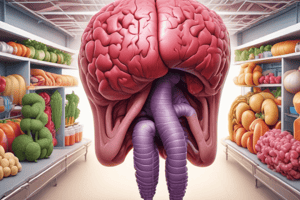Podcast
Questions and Answers
¿Cuál es el órgano donde se inicia el proceso de digestión, tanto mecánica como químicamente?
¿Cuál es el órgano donde se inicia el proceso de digestión, tanto mecánica como químicamente?
- Recto
- Estómago (correct)
- Intestino delgado
- Esófago
¿Cuál de las siguientes enzimas se encuentra en la saliva y ayuda a descomponer los carbohidratos en azúcares simples?
¿Cuál de las siguientes enzimas se encuentra en la saliva y ayuda a descomponer los carbohidratos en azúcares simples?
- Tripsina
- Amilasa (correct)
- Lipasa
- Pepsina
¿Qué función cumplen las glándulas gástricas en el proceso digestivo?
¿Qué función cumplen las glándulas gástricas en el proceso digestivo?
- Neutralizar el pH del quimo
- Producir ácido clorhídrico y enzimas digestivas (correct)
- Secreción de insulina
- Producir sales biliares
¿Qué proceso físico propulsa los alimentos desde la boca hacia el estómago a través del esófago?
¿Qué proceso físico propulsa los alimentos desde la boca hacia el estómago a través del esófago?
¿Cuál es la función principal de la chime formada en el estómago durante el proceso digestivo?
¿Cuál es la función principal de la chime formada en el estómago durante el proceso digestivo?
¿Dónde ocurre la mayor parte de la absorción de nutrientes en el sistema digestivo?
¿Dónde ocurre la mayor parte de la absorción de nutrientes en el sistema digestivo?
¿Cuál de las siguientes enzimas ayuda en la descomposición química de grasas, proteínas y carbohidratos en el intestino delgado?
¿Cuál de las siguientes enzimas ayuda en la descomposición química de grasas, proteínas y carbohidratos en el intestino delgado?
¿Qué función tiene la vesícula biliar en el proceso digestivo?
¿Qué función tiene la vesícula biliar en el proceso digestivo?
¿Qué papel desempeña el bazo en el sistema digestivo?
¿Qué papel desempeña el bazo en el sistema digestivo?
¿Cuál es el papel del sistema nervioso parasimpático en la digestión?
¿Cuál es el papel del sistema nervioso parasimpático en la digestión?
Flashcards are hidden until you start studying
Study Notes
The Digestive System: Unraveling the Process of Breaking Down Food
The digestive system is a complex, intricate network of organs, glands, and tissues that work together to transform the food we consume into the nutrients our bodies require. This process, known as digestion, is a fascinating dance of chemical reactions, physical actions, and biological processes that allows us to thrive. Let's delve deeper into this fascinating topic.
Overview of the Digestive System
The human digestive system begins in the mouth, continues through the esophagus, stomach, small intestine, large intestine, and rectum, and concludes with the expulsion of waste through the anus. Along the way, food is broken down into smaller particles, nutrients are absorbed, and waste is eliminated.
The Digestive Process
The digestive process begins in the mouth, where we initiate the breakdown of food through mechanical (chewing) and chemical (saliva) actions. Saliva contains enzymes like amylase that start to break down carbohydrates into simple sugars, making them easier to digest.
Next, food moves into the esophagus, a muscular tube that propels food into the stomach through peristalsis—the rhythmic contractions of the esophagus's walls. At the stomach's bottom, powerful gastric glands secrete hydrochloric acid and enzymes like pepsin, which break down proteins into smaller peptides.
The stomach mixes the partially digested food with acid and enzymes, forming a semi-liquid mixture called chyme. Chyme then moves into the small intestine, where most of the nutrient absorption occurs. Here, the chyme is exposed to the small intestine's lining, which contains numerous finger-like projections called villi and microvilli. These structures maximize the surface area for nutrient absorption.
Enzymes, like trypsin and lipase, secreted by the pancreas and liver, aid in the chemical breakdown of fats, proteins, and carbohydrates in the small intestine.
The small intestine empties into the large intestine, also known as the colon, where water and electrolytes are absorbed. Most of the remaining waste, now called feces, is stored in the rectum until it passes through the anal canal and exits the body.
Regulation of the Digestive System
The digestive system operates on a circadian rhythm, influenced by hormonal and nervous system input. Hormones like gastrin and cholecystokinin regulate gastric acid secretion and pancreatic enzyme release, among other functions.
The nervous system plays a significant role in the digestive process. The parasympathetic nervous system stimulates the digestive process, while the sympathetic nervous system inhibits it during times of stress. The enteric nervous system, located in the walls of the gastrointestinal tract, regulates and coordinates the contractions and secretions.
Specific Organs and Their Functions
The liver, located in the upper right corner of the abdomen, plays a vital role in detoxification, cholesterol synthesis, and the production of bile, which aids in the digestion and absorption of fats. The gallbladder stores and concentrates bile, releasing it when needed.
The pancreas, located behind the stomach, secretes digestive enzymes and hormones. It is essential for the efficient breakdown of carbohydrates, proteins, and fats.
The spleen, located in the upper left abdomen, is an essential part of the immune system, but it also plays a role in the digestive process by filtering old red blood cells and producing white blood cells.
Conclusion
The digestive system is a complex series of organs and processes that work together to ensure our bodies receive the nutrients we need to thrive. Keeping this system healthy is essential to overall well-being and quality of life. Understanding the digestive process and the specific roles of each organ can help us better appreciate the complexity of this essential system.
Studying That Suits You
Use AI to generate personalized quizzes and flashcards to suit your learning preferences.




